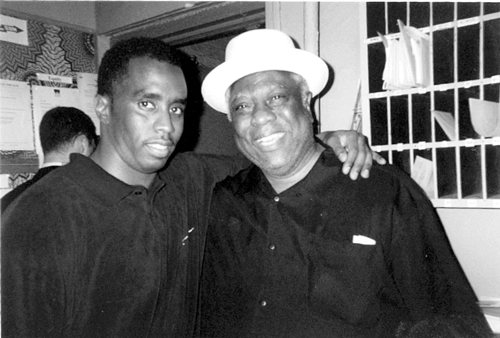By JERRY TALLMER
Woodie King, Jr., grew up in Detroit. Douglas Turner Ward grew up in New Orleans. Separately, yet together––one inspired by the remarkable son of an impoverished dirt farmer in the Bahamas, the other by a brilliant young woman from Chicago who was to die two lifetimes too soon––Woodie King and Doug Ward changed the face of black theater in America. No, they gave a face, a self, a raison d’être, to black theater in New York City and America.
The year was 1970. The place was the basement of St. Augustine’s Episcopal Church on Henry Street on the Lower East Side. The play was “Suddenly Last Summer,” by Tennessee Williams, directed by 33-year-old Woodie King, Jr., with a multi-ethnic cast.
“We made the whole church into a garden,” said King, now 67. “It was a huge hit. Tennessee Williams came down to see it. Everything in those days ran four weekends. Equity had not yet defined what a showcase was. We were pioneers in that respect. So now, about 210 performances later…”
Now the New Federal Theater, King’s venture into putting emphasis on people of color and women both onstage and backstage, is a historic 35 years old, an advent to be celebrated in an all-star evening February 13 at Town Hall. Among the expected stars––Harry Belafonte, Ossie Davis, C, Virginia Fields, Cicely Tyson, Robert Hooks, Samuel L. Jackson, Byron Lewis, Ruben Santiago-Hudson Denzel Washington and Phylicia Rashad.
If someone would let Sidney Poitier know, he might turn up too. He should. It was he who set afire the Detroit teenager who in 1958 happened upon a movie called “The Defiant Ones,” starring Poitier and Tony Curtis as runaways handcuffed together.
“I’d never seen anything like it,” King said recently. “I went back again, and again, and again.”
“Do you realize,” he continued, “that when Sidney Poitier came to New York from Nassau at the age of 15, he could not read? He slept on rooftops [and in the bus terminal toilets], and taught himself to read. By his 20s, he was already in two Hollywood movies. For ‘The Defiant Ones’ he was nominated for an Academy Award. From not being able to read, he had come all the way to being nominated for an Oscar.
“And I said to myself, ‘If I can read, why can’t I do that?’ In those days, libraries were open from ten in the morning to eight at night. There was a librarian in Detroit named Kurtz Meyers––he died last year at 88. He gave me everything to read that he could. And that’s when I looked into theater schools, and found the Will-O-Way Apprentice Theater in Bloomfield Hills, Michigan.”
Poitier was also, in his Oscar nomination year of 1959, on Broadway, in the role of Walter Lee Younger, one of the stars of a smash-through drama called ‘A Raisin in the Sun’ by a 29-year-old young black woman from Chicago, Lorraine Hansberry. The play eventually went on the road.
“Woodie had met me and Robert Hooks when we were on the road in the cast of ‘Raisin’ and reached Detroit,’ recalled Douglas Turner Ward. In 1967, three years before the conception of the New Federal Theater, Ward had launched, with Hobby Hooks, the seminal Negro Ensemble Company (NEC) that broke down walls––especially those in people’s heads—which had existed in American theater as long as America had existed.
For that accomplishment, actor/director/playwright Ward is himself to be “roasted and toasted” during the February 13 Town Hall tribute to Woodie King at Town Hall. Two large, impressive, artistically crucial black men are getting no more than recognition long due them.
“My roast,” Ward said dryly, “is trying to survive.”
In 1965, two comedies by Ward, “Happy Ending” and “Day of Absence”––the latter exploring what happened to a town in the white South when one day every black soul in it, the people who did the dirty work, disappeared––opened at the St. Mark’s Playhouse, one flight up over the Orchidia Restaurant on Second Avenue at Eighth Street.
“I was on the train going to Washington to perform in Athol Fugard’s ‘The Blood Knot,’” Ward recalled, “when I opened the New York Post and saw the word ‘hilarious’ in a headline over a review. I nearly had a heart attack. It was me––that is, a review [by this newspaperman] of ‘Happy Ending,’ in which Frances Foster and Esther Rolle, who would become mainstays of the Negro Ensemble company, played two maids.
“Bobby [Hooks] had this kids’ workshop. He came to me and said, ‘Look, we’ve already got 50 percent of a hit review. Why don’t we put the two plays together?’ Which is what we did. After a year, when ‘Day of Absence’ was still running, the New York Times invited me to write a piece, almost a manifesto.
‘It ran––a full page––under the headline “American Theater… For Whites Only?’ and argued that, if given the chance, we would change the color of American theater.”
The Ford Foundation’s McNeil Lowry, who is a remarkable human being, read that article, and sat down with Ward, Hooks and their business manager, a white man named Gerald Krone.
“Mac invited us to submit a proposal,” Ward recalled. “Bobby and Gerald and I literally sat at the Orchidia, the restaurant below the theater and worked it out on the tablecloth. We said, ‘Look, we’re not interested in a one-year thing.’ We weren’t even sure three years was enough to do what we wanted to do.”
In the end, the group received $400,000 to start the NEC, on a three-year grant of $1 million. The first production, in 1967, was “The Song of the Lusitania Bogey,” Lusitania being the name the Portuguese applied to their early colonies in Africa. The playwright was Germany’s Peter Weiss, whom Ward had met when Weiss’ shattering “Marat/Sade” came to New York.
“I had written that piece in The Times,” Ward stated, even more dryly, “telling them what should be done, but I didn’t mean it to be me. I had other things to do. My writing. My acting.”
Ward’s substantial career as an actor includes the early role in “Raisin in the Sun.” He’d come to New York after dropping out of the University of Michigan. Lorraine Hansberry had come to New York at about the same time after dropping out of the University of Wisconsin.
Douglas Turner Ward (born Roosevelt Ward) hadn’t meant it to be him, but for the next 20 years and then some, the Negro Ensemble Company was him indeed. And it changed the color of American theater.
“From 1958 to 1960,” recalled Woodie King, the son of truck driver Woodie King, Sr., “all I did was go to the library and read Beckett, read Pirandello, all that. Theresa Way Merrill, the founder of Will-O-Way, a lady in a wheelchair, took me to breakfast and kept me all day, talking about theater. She gave me a scholarship. There were only maybe three blacks on stage at that school, and they couldn’t do no lead roles. So I learned to be a stage manager, build sets and direct.
“In 1965 in New York, I was hired as a replacement understudy in the ‘Day of Absence’/’Happy Ending’ double-bill.
“A few years later I was working on the Lower East Side at Mobilization for Youth [MFY] along with a guy named Val Coleman [an Irish-American radical], whose wife, novelist Ann Borowik, had at one time been Otto Preminger’s daughter. Long before there were black movies, she and Val wanted to make a movie from her football novel, ‘Lions Three, Christians Nothing.’
‘Val introduced me to Otto Preminger, and then, in the office, Val and Otto got into a fight, and that was the end of that. But out of MFY, where we trained young people in dance, theater, film, music and art came the New Federal Theater, named for Hallie Flanagan’s Federal Theater under FDR in the 1930s.
“Bertram Beck, the head of MFY, was offered directorship of the Henry Street Settlement, and he asked me to come along. In 1970 I ran the arts program at Henry Street, a combination of Asian, Jewish, Latino and black theater.
“The main office was at 265 Henry Street, and the playhouse was at 466 Grand Street. When I came there,” King said, his hands in rotation to describe the scene, “all the other buildings were slum buildings.”
A spanking new facility at the Grand Street address, the Louis Abrons Art Center––three theaters under one roof––was completed in 1974. And is there still.
“A lot of people think we’re out of business” said King. “We aren’t. But the irony of it is, when the New Federal started, I thought I’d be directing a lot of plays. Though I’ve directed many shows all over the country and still do, in 35 years I’ve only directed seven plays at my own theater.”
And he’s also managed to keep a vital theater resource open for three and a half decades.
“Catch the Spirit of Black Theater,” a salute to Woodie King Jr.’s New Federal Theater on its 35th anniversary, with a special “ roast and toast” to the Negro Ensemble Company’s Douglas Turner Ward, will be held on Sunday, February 13 at 3 p.m. Town Hall, 123 W. 43rd St. Tickets range from $75 to $300 (a price which includes the dinner afterward) and can be ordered at Ticketmaster, 212-307-4100.




































